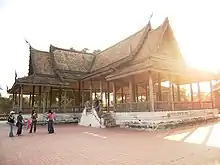ศาลา
Thai
.jpg.webp)
1

1
.jpg.webp)
4
Etymology
From Sanskrit शाला (śālā, “court; hall; house; workshop”); perhaps via Old Khmer śālā, śāla (“court; hall; house; covered shelter; workshop; large building; large room; etc”). Cognate with Lü ᦉᦱᦟᦱ (ṡaalaa), Modern Khmer សាលា (saalaa). Doublet of ศาล (sǎan).
Pronunciation
| Orthographic | ศาลา ɕ ā l ā | |
| Phonemic | สา-ลา s ā – l ā | |
| Romanization | Paiboon | sǎa-laa |
| Royal Institute | sa-la | |
| (standard) IPA(key) | /saː˩˩˦.laː˧/(R) | |
Noun
ศาลา • (sǎa-laa) (classifier หลัง)
- pavilion: open building used for any purpose, traditionally used as a place of gathering or meeting.
- (historical) hall or pavilion within a palace, employed as a meeting place of government ministers.
- (by extension) hall; public hall; common hall; hall of assembly, gathering, or meeting; auditorium; forum.
- (colloquial, Buddhism) hall or pavilion at a temple, especially one used as a funeral venue.
Derived terms
- กรรมศาลา
- จองศาลา (jɔɔng-sǎa-laa)
- ฉทานศาลา
- ตบหัวกลางศาลา ขอขมาที่บ้าน
- บรรณศาลา
- บอกศาลา
- ลูกขุน ณ ศาลา
- ลูกขุนศาลา
- ศาลากลาง (sǎa-laa-glaang)
- ศาลากลางย่าน
- ศาลาการเปรียญ
- ศาลาฉทาน
- ศาลาดิน
- ศาลาตักบาตร
- ศาลาบาตร
- ศาลายก
- ศาลาราย
- ศาลาริมทาง
- ศาลาโรงธรรม
- ศาลาลูกขุน
- ศาลาลูกขุนนอก
- ศาลาลูกขุนใน
- ศาลาเล็ก
- ศาลาวัด
- ศาลาว่าการ
- ศาลาสรง
- สุขศาลา
- อาปานศาลา
- อาสนศาลา
This article is issued from Wiktionary. The text is licensed under Creative Commons - Attribution - Sharealike. Additional terms may apply for the media files.